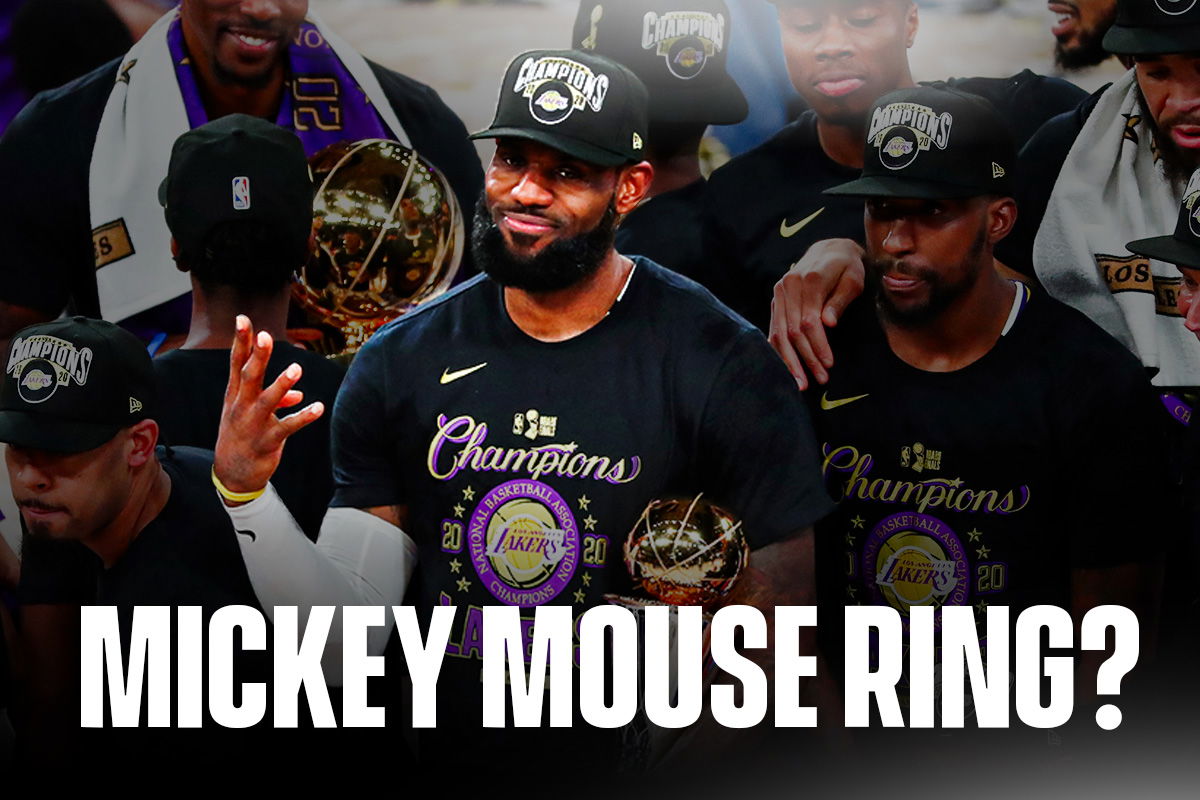
Imago
Oct 11, 2020; Lake Buena Vista, Florida, USA; Los Angeles Lakers forward LeBron James (23) holds up four fingers after winning his fourth NBA championship after game six of the 2020 NBA Finals at AdventHealth Arena. The Los Angeles Lakers won 106-93 to win the series. Mandatory Credit: Kim Klement-Imagn Images

Imago
Oct 11, 2020; Lake Buena Vista, Florida, USA; Los Angeles Lakers forward LeBron James (23) holds up four fingers after winning his fourth NBA championship after game six of the 2020 NBA Finals at AdventHealth Arena. The Los Angeles Lakers won 106-93 to win the series. Mandatory Credit: Kim Klement-Imagn Images
“Everyone I speak to around the league privately agrees that it doesn’t truly hold up as a genuine championship…will forever be marked by an asterisk” That was Daryl Morey, and with those words, he threw a fresh tank of gasoline on one of the NBA’s most exhausted debates: was the 2020 NBA Bubble championship legit? Sure, he was just repeating what he’s heard whispered around the league, but it doesn’t matter. The comment gave a new voice to the critics who have wanted to slap an asterisk on that title for years.
Watch What’s Trending Now!
But what if that asterisk isn’t a bad thing? What if it’s the opposite? The 2020 championship doesn’t just count, it stands as one of the most unique and hard-earned victories in NBA history. It deserves an asterisk, but not one of doubt. It deserves a good asterisk—a mark that signifies resilience, adaptability, and a level of mental toughness we may never see again.
To dismiss that title because it was different is to completely misunderstand what it took to survive, let alone win, in that pressure.
ADVERTISEMENT
The mental warfare of the NBA Bubble Championship
So why was the bubble so tough? Forget the fancy hotels and the Disney World backdrop. For the players, it was a psychological pressure cooker. The pandemic had turned the world upside down, and these guys were cut off from their families for months, living in a confined, high-stakes environment with constant testing and strict protocols.
But the real battle was a mental one. As LeBron James, the Finals MVP of that season, explained, there was no escape. “Every morning you have to get tested. You might bump into [your opponent] in the courtyard when you’re eating,” he said. “That’s like some mental warfare. There’s no escape… when it’s time for me to finally relax and go back and a glass of wine, I’m bumping into this guy in the elevator.” It was a constant, 24/7 psychological grind, a test of who would blink first.
ADVERTISEMENT
The league itself knew how intense the situation was. For the first time, the NBA and the NBPA required every team to have a licensed mental health professional on staff and provided 24/7 access to on-site clinicians. Dr. William Parham, the director of the NBPA’s mental health program, predicted the bubble would lead to “anxiety, fear, uncertainty, confusion, hypervigilance, [and] depression.” Players like Paul George felt it, too.
As the Heat’s Jae Crowder put it, “The most important part for me is mentally… you may have some days where it’s tougher.” The Celtics’ Jaylen Brown was even more direct: “Being here in the bubble… it is a challenge to a lot of guys. It’s like you’re at work all the time… I definitely want to bring awareness to mental health.”
ADVERTISEMENT
Top Stories
Mavericks Under Fire Over Anthony Davis Trade for $33M Star
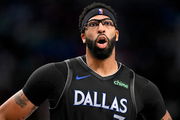
Fans Express Disbelief After ESPN Exposes ‘Free League Pass’ as Part of WNBA’s CBA Pitch
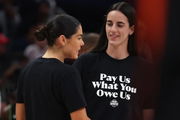
What Happened to Peyton Watson? Nuggets Star Makes Injury Exit to Locker Room vs Knicks
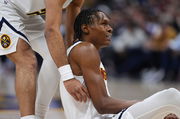
“Gonna Make More Than Your Brother”: LeBron’s Son Bryce James Makes Money Move With Redshirt Decision – Here’s How
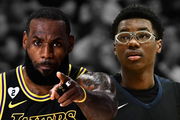
Shai Gilgeous-Alexander Faces Injury Update as Video Emerges Before 5-Game Absence
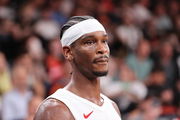
This was triumph over adversity, not a shortcut. To deny the title’s legitimacy because the circumstances were different is to misunderstand how greatness is forged. Sports history is full of champions who won under extraordinary conditions—wars, strikes, and lockouts. The 1999 San Antonio Spurs won a title in a lockout-shortened 50-game season, a gritty achievement that is never questioned. As ESPN’s Michael Wilbon noted, champions who win in these moments are “writing a different kind of history — not tainted but transcendent.”
The 2020 bubble is another chapter in that legacy. Players weren’t just battling opponents; they were navigating a global pandemic and a powerful social justice movement. As Stephen A. Smith put it, they were “warriors on multiple fronts.” The championship, therefore, carries a powerful good asterisk, symbolizing courage and excellence under daunting circumstances. As analyst Zach Lowe argued, the 2020 title “shouldn’t get an asterisk, it should get a star.”
ADVERTISEMENT
More than a title: The case for the Lakers’ Bubble ring
Let’s get one thing straight: the Lakers were already the best team in the league before the bubble even started. When the season shut down, they were sitting pretty at 49-14, the top dogs in the West. And it wasn’t a fluke. In the weeks right before the shutdown, they convincingly beat the other two top contenders, the Milwaukee Bucks and the LA Clippers. The bubble didn’t create a path for them; it was simply the stage where they finished what they had already started.
And that stage? It was the great equalizer. The bubble stripped away the single biggest advantage in sports: home-court advantage. No screaming fans, no friendly rims, no travel fatigue. Historically, home teams have won around 60-63% of games, a number that skyrockets to nearly 80% in the pressure cooker of a Game 7. The bubble erased all of that. It was, as LeBron called it, “the purest form of hoops… strictly basketball.” And in that environment, only the strongest survived. Giannis Antetokounmpo, the MVP of that season, knew it from the start. “I feel like this is going to be the toughest championship you could ever win,” he said at the time.
And for the Lakers, that run carried an extra layer of emotional weight that no spreadsheet can measure. Because for the Lakers, this wasn’t just about basketball. It was about Kobe. Just months after his tragic death, the team was playing with a heavy heart, carrying the weight of a city’s grief and the legacy of a legend. This wasn’t just a title run; it was a tribute. As then-coach Frank Vogel said, “We’ve always wanted to make him proud.”
ADVERTISEMENT
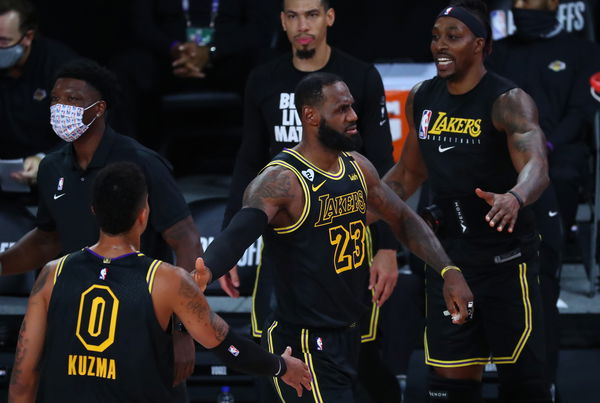
ADVERTISEMENT
That mission became the team’s emotional compass. They closed every huddle with “1-2-3… Mamba!” and wore special “Black Mamba” jerseys designed by Kobe himself. When Anthony Davis hit a game-winning buzzer-beater in those jerseys, he pounded his chest and yelled, “Kobe!” After they won it all, Davis was emotional. “Kobe, I know he’s looking down on us super proud,” he said. “All we wanted to do was do it for him, and we didn’t let him down.”
That’s what makes Morey’s comments feel so hollow. Here’s a guy who, in 13 seasons as a GM, never made it to the Finals. And his own Rockets team got bounced by the Lakers in five games in that very same bubble. It’s hard not to see it as sour grapes, a point Stephen A. Smith drove home when he said Morey is “allergic to championships.” Morey even admitted he would have celebrated a Rockets bubble title as legit, a hypocrisy that wasn’t lost on anyone. He tried to walk it back, but the damage was done.
“good asterisk.”ADVERTISEMENT
ADVERTISEMENT
ADVERTISEMENT
ADVERTISEMENT